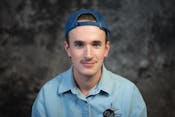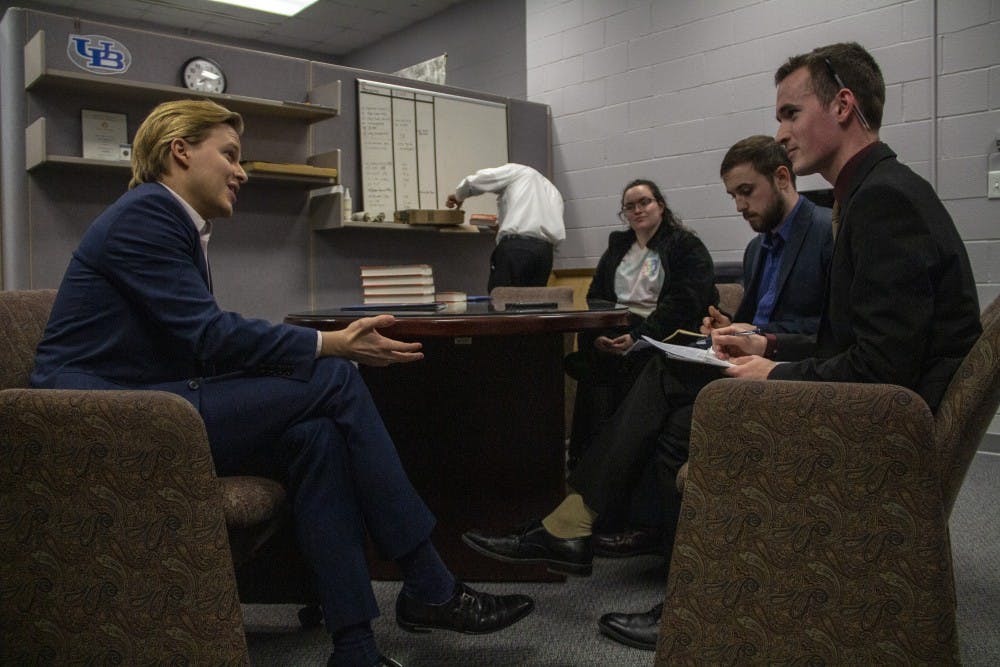Ronan Farrow has gone from a 15-year-old college graduate to joining a White House administration at 22. Farrow, now 31, has been heralded for his reporting on sexual abuse cases, winning the Pulitzer for his reporting on the Harvey Weinstein sexual abuse scandal. Farrow had an exclusive interview with The Spectrum shortly before his speech in the Center for the Arts for the 32nd Distinguished Speakers Series.
Q: Your reporting on Harvey Weinstein covered a lot in terms of his life. He went to UB and wrote columns for our publication The Spectrum. In your research, did you come across any information relative to the university or Buffalo in general?
A: Any deeper discussion of the story is going to go back to that part of his personal history. It is mentioned that [UB] is where he got his start with his work as a show organizer and how that sort of led him to producing. I wasn’t fully read up on his writing as a student and it’s fascinating. Great work on [The Spectrum’s] part on bringing that up.
Q: Much is made about your education, having earned a BA when you were 15. But today, the modern notion of a college degree is that it's slowly being devalued as time goes on. What is your own take on that? And even in other industries, like journalism, where it seems like industry standards have shifted. How do you see that changing in the future?
A: I'm not an education policy expert, but I have seen it argued persuasively, that we need to emphasize professional degrees and associate's degrees more. Prepare people for various service industries, for instance, to get them technical training rather than a liberal arts education. I think the two approaches can coexist. Certainly there is a kind of path, probably including mine that's well suited to the kind of liberal arts education that you're talking about. I think there are plenty of paths that don't necessarily have to involve that. I think we need a lot of reforming a whole lot of different areas to keep people educated and prepared for the job market. And we should all be open minded to that looking like a lot of different things.
Q: I want to ask with the recent developments on the Mueller Report, like everyone is talking about now, with the 300 pages. What are your thoughts on how major publications have been covering the report?
A: You know, I keep my head down and I work on my own investigation. And it's not really for me to comment on what people should or shouldn't be reporting on at other publications. I can say that the principal I generally operate on, is when I have the goods I report something and when I don't I keep my mouth shut.
Q: The Spectrum has done stories before on the decreasing participation in student government elections at UB, showing a downward trend. This year, the trend for Student Association executive board candidates has gone up, but overall it has been a downward trend. What do you attribute to that and how would a lack of participation affect a small community like a college campus?
A: I think participation is incredibly important. Generally speaking, just from an anecdotal standpoint, I've been lucky enough to talk to a lot of students on a lot of different campuses and I've sensed that people are tremendously engaged. Maybe that's a selection bias because the people I run into are industrious journalism majors who bother to come out to an event like this one. So I'm not seeing the full slice of the population in the way that you guys are with that data, but I’m encouraged by the conversations I have with college kids around the country. I think it's a time when we need engagement from this next generation. I just had a case where a source I was working with was swayed by their college-age daughter, really advocating for it being the right thing to talk. So I'm in a particularly positive frame of mind about the power of the next generation to motivate people to do the right thing.
Cutting through apathy and people feeling like their voices aren't going to make a difference is always challenge. You know, you guys have your work cut out for you. I hope that you can put in place structures on campus to make people feel heard and make it feel like it's worth their time to take action.
Q: Do you think the press takes some role in that, at least like in terms of government?
A: I think student journalism can be a great tool for that. That's a great way to directly ferret out things that are troubling, things that are going right. Really give people on campus more of an appreciation of the truth of what's happening around them. I would love to see
a student paper break a huge historic story. I mean student papers constantly do significant reporting. Including [The Spectrum] on this campus. Honestly, if you guys get onto like a huge lead, you should tell me because I'd love to make a documentary about it or something. I just think it's a really under-tapped reservoir of potential.
Q: The Spectrum reported on the World Mission Society Church of God back in September, similar to your own coverage two years ago. Members were going up to students on campus, trying to recruit them. It raised questions around UB on solicitors being on campus property. Given that UB is public property, what is your stance on it?
A: These issues around fringe religious groups that recruit really aggressively are incredibly tough to navigate from a policy standpoint and incredibly tough to report on. If you look back at the reporting I did on the World Mission Society Church of God, it's very careful. It's very even handed. You obviously want to protect people's rights to worship in whatever way they see fit. But there's a very vigorous debate around that particular group, as to if people are voluntarily being brought into the group, or whether there's some degree of manipulation or brainwashing. People cut themselves off from their families in a very, very radical way in a lot of cases with that group and it leaves behind a lot of emotional wreckage. What I tried to do in that reporting was to capture both sides of that equation. We followed a family going across the country to try to get their daughter out of the group. We sat down for a long time with the daughter. She was able to explain why she felt her parents were wrong about this and that it was completely voluntary. Why she had cut herself off from everyone she knew before and married a guy who didn't speak the same language and become a devotee of this group.
Q: You discussed before the interview the idea of looking at things in a holistic manner. Would you say that your World Mission Society Church of God coverage was an example of that?
A: What I was talking about there specifically was on the foreign policy arena, needing to not just have a military-to-military approach, but to broaden out. What I'm talking about here with perspective in investigative journalism is just fairness. I've said a lot publicly, I'm not an activist. I'm always willing to drop a story if the evidence isn't there. I'm always willing to change the thrust of the story if new evidence emerges. You really try to trust the public, to be sophisticated enough to handle a nuanced presentation of all of the evidence and all the perspectives. If you look at any of those Harvey Weinstein articles, there's paragraphs and paragraphs of denials and making the case for himself. Kind of saying whatever he wants to say, at whatever length he wants to say. And the advantage of that is no one can accuse you of being biased when you then let the alleged victim say exactly what they want to say. But it's also not relativists that philosophy. There is still the concept of the truth and if you're a good investigator, you're presenting the facts. You're not making a case but you're also not just saying, there is this perspective and this perspective, you are saying here are the facts.
Q: With different things such as the Maryland newspaper shooting and the bomb scare at the CNN New York headquarters happening and even yourself having been under attack in terms of blackmail, how does someone deal with situations like those?
A: There's a couple of things going on. One is that this is not a new phenomenon. The space for journalists to do this kind of work, especially holding powerful people accountable, has always been small and precarious. That's especially true internationally. There's really no comparison between any of the threats faced by journalists here, compared to the kinds of threats faced by journalists for instance in Pakistan. That's one of many places where if you are speaking truth to power, you’re very possibly are ending up dead the next time. On the one hand, I feel incredibly grateful to be working in a country with robust First Amendment protections, where violence against journalists is minimal. Not to say that it doesn't happen, but violence specifically motivated by journalists work and violence that's sanctioned by the government and law enforcement against journalists, doesn't really happen here on a significant scale. That said, you're exactly right to say that there are significant obstacles faced by reporters here. And there is authoritarian political rhetoric that gets weaponized to incite people to turn on reporters and that, that is scary. It narrows the gap between us and those places where journalists are killed for their work. And that's very, very troubling.
Benjamin Blanchet and Thomas Zafonte are editors and can be reached at: benjamin.blanchet@ubspectrum.com and thomas.zafonte@ubspectrum.com and on Twitter @BenjaminUBSpec and @Thomas_Spectrum.

Benjamin Blanchet is the senior engagement editor for The Spectrum. His words have been seen in The Buffalo News (Gusto) and The Sun newspapers of Western New York. Loves cryptoquip and double-doubles.
Thomas Zafonte is a senior English major. He is a UB sports fan and enjoys traveling around Buffalo.






